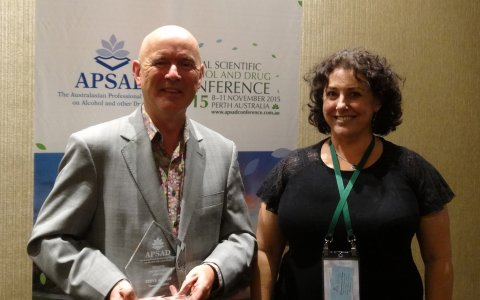APSAD Awards recognise excellence in science, research and practice
Congratulations to the recipients of the 2015 APSAD Awards for Excellence in Science, Research and Practice, presented as part of the recent annual APSAD conference in Perth. The annual Australasian Professional Society on Alcohol and other Drugs (APSAD) Awards recognise individuals who have made outstanding contributions to reducing the harms associated with alcohol and other drug (AOD) use in Australasia.
Senior Scientist Award – Professor Steve Allsop, National Drug Research Institute, Curtin University
Steve Allsop is an internationally renowned researcher in AOD who has made a significant contribution to the field over the past 30 years, including through mentoring many developing researchers. Deputy chair of the Australian National Advisory Council on Alcohol and Drugs, Steve contributes to national and international policy debate and research and has facilitated the debate on state/territory and national drug strategies, including involvement in developing the previous National Amphetamine-Type Stimulants Strategy.
The Senior Scientist Award is for a scientist who has made an outstanding contribution to the field of substance use and misuse.
Mentor Award – Associate Professor Raimondo Bruno, University of Tasmania
As a researcher committed to advancing young researchers' careers before his own, Raimondo Bruno is a worthy winner of the inaugural APSAD Mentor Award. In just 10 years, he has mentored 80 postgraduate students and early career researchers while maintaining many teaching and research roles. His commitment to helping students and young researchers is reflected in results: half of his Clinical Psychology research students are employed in the sector and many have received awards including a Rhodes Scholarship.
The Mentor Award recognises an individual who has made an important contribution to mentoring and supporting the career development of clinicians, researchers or students.
Early Career Award – Dr Amy Peacock, Postdoctoral Fellow, University of Tasmania
Amy Peacock is an emerging leader in the AOD field. She has authored 29 publications and is already an international authority on the harms of mixing alcohol and energy drinks – all within four years of starting her research career. She led the first systematic review published internationally comparing harms of consuming alcohol mixed with energy drinks, and her work has been incorporated into European food safety guidelines.
The Early Career Award is for excellence in research relative to career opportunities.
First Peoples Award – Kathleen James, Counsellor, Palmerston Association, WA
Kathleen James is an Aboriginal woman who has worked as a counsellor in the addictions field since 2008. Kate is a role model for other Aboriginal staff and clients and provides leadership in providing culturally secure services to the Aboriginal community. She has run youth programs at Banksia Hill Detention Centre and established programs to reach disadvantaged young Aboriginal people, including for students at a local high school, and is currently the only Aboriginal counsellor at the Rockingham branch of Palmerston Association – a not for profit providing counselling and support for people with AOD issues.
The First Peoples Award recognises an individual that has made an important contribution to the advancement of the health of Aboriginal, Torres Strait Islander or Māori peoples.
Clinician Award – Rose McCrohan, Manager/Nurse Practitioner, UnitingCare ReGen, Victoria
Victoria's first Alcohol and Other Drug Nurse Practitioner, Rose McCrohan has been a trailblazer in AOD nursing treatment over almost 25 years, managing or helping establish multiple withdrawal programs. "Rose's knowledge and experience have been invaluable to the sector. Her ability to create an environment for positive change for clients has impacted on many lives," her nominator said. Rose is also part of the ReGen team setting up Victoria's first mother and baby withdrawal service.
The Clinician Award recognises excellence and leadership in clinical practice in substance use in any discipline.
Incoming APSAD President Lynda Berends said the APSAD Awards were designed to acknowledge significant contributions to AOD science, practice, and mentorship; recognise and support young scientists and clinicians with exceptional potential; and provide role models for future generations of AOD scientists and clinicians.
"Given the relative size of the AOD research sector, we significantly punch above our weight in terms of the calibre of people and the calibre of research being produced here in Australasia," Dr Berends said.
"The achievements of the 2015 APSAD Award recipients, and the diverse areas they work in within the AOD field, reflect the strength and talent that makes our region recognised globally in this field."
The Australasian Professional Society on Alcohol and other Drugs (APSAD) is the preeminent membership organisation catering to the interests of alcohol and other drug professionals in Australasia, including clinicians, practitioners, educators, policy specialists and academics.












